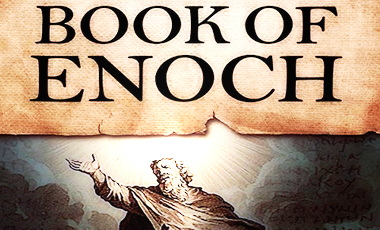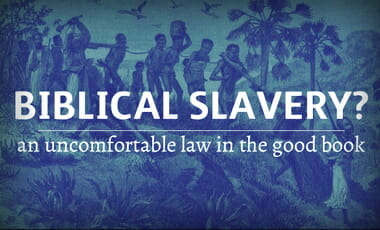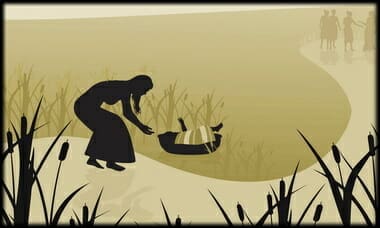Why this post? I was in a conversation that took a turn to Enoch as a proof text for a theological viewpoint. I will include a section from it that gets to why I cobbled together the post following this dialogue excerpt. First, as I pickup the convo, STACY M. said that history and Scriptures were “scrubbed by Rome.” Keep that in mind as you travel through this convo:
RPT: So, explain [please], what have you “dug and found” that history has scrubbed?
Stacy M: Eye witness accounts to the armies in the sky. Evidence of highly advanced, free energy architecture. Evidence of the sun not giving it’s light for a whole year, as prophesied in Enoch. There’s so much to find.
RPT: Sounds a bit “New Age’ish” [….] especially with Enoch being mentioned. Do you have a book or article you would recommend?
Stacy M: Enoch isn’t “new age.” ? It was removed from the canon because it contains truths that go against the “Jesus is your savior” narrative constructed by Rome.
One channel that has lots of amazing research is The Unexpected Cosmology on YouTube. While I don’t agree with him wholly, he does deep dive extensively.
COMMENT ON REFERENCED RESOURCE: an unorthodox, almost cultic
reservoir of odd, far-fetched, flat earther, and wild eschatological stuff.
RPT: What is your evidence it was removed with a narrative constructed by Rome?
Stacy M: My evidence Enoch is removed by Rome is its not in any modern Bible.
RPT: That is a bit of circular reasoning. Like, red is the color red. Or, to put into a bullet point:
- A is true, because B is true
- B is true, because A is true
So, you may not know WHY the Old Testament canon is the way the Bible shows it today. I isolated and PDF’ed a section on this and uploaded it to my website to read online or download (and print out if that is easier). That is a better place to start than circular reasoning.
Stacy M: I know “why” the Canon is as it is…Yahushua took the whole house of Israel with Him at the destruction of the temple. All that was left was corruption.
RPT: Okay. So no answer is your answer. Just out of curiosity, if you were to join with others who think like you do… what is your religious group called?
Stacy M: There IS an answer. You just haven’t looked into it. Maybe start seeking. I gave you one resource. I prefer to jump off at HEARING the word… not trying to make the word fit into today.
I’m of no religion.
RPT: “I’m of no religion” meetings must be lonely.
ERGO . . . .
Should Enoch be included in the Bible? How old is Enoch? Is there any truth in this book?
See my PDF excerpt take from EVIDENCE THAT DEMANDS A VERDICT for how the Old Testament Canon was compiled. In a good post by CHRISTIAN QUESTIONS we see this short description:
The Book of Enoch was never considered authentic by the Jewish rabbis, and it was never included in the Hebrew Scriptures’ canon. There are twenty Book of Enoch manuscripts in the Dead Sea Scrolls, but all are in Aramaic, not Hebrew. Thus, they are not part of the Hebrew Old Testament. We have far less early manuscripts for the Book of Enoch than we do for the recognized canon. For comparison, we have a thousand manuscripts for each of the four Gospels, 500 for the book of Acts and the Epistles and several hundred for the book of Revelation. This indicates Enoch was not as acclaimed as the books deemed to be inspired. Throughout the Gospel Age, it was never up for consideration to be part of the Bible, including in the Catholic or Greek Orthodox Bibles.
[….]
The rules of canonicity were the general recognition of certain practical ideals, described in three principles:
- The writings had to be authored by a recognized prophet, apostle or someone associated with them.
- The writings could not contradict previously-accepted books of Scripture.
- The writings had to be widely accepted by the church and its leaders as inspired of God.
The Book of Enoch Would be Included In This List by James White
TRANSCRIPT of the ABOVE:
And so as we examined this issue this evening, my thesis will be very straightforward.
The Apocryphal books, including Tobit, Judith, the Maccabees, Sirach, along with the additions to the canonical books like Baruch, Bell and the Dragon and the Epistle to Jeremiah. Whatever it might be, they are not inspired Scripture. These books were not accepted as Canonical scripture, by the Jews, to whom the oracles of God had been committed as the apostle Paul says in Romans chapter 3 verse 2.
SCRIPTURE BREAK ~ ROMANS 3:1-2
(NCV) So, do Jews have anything that other people do not have? [….] The most important thing is this: God trusted the Jews with his teachings.
(CSB) So what advantage does the Jew have? [….] First, they were entrusted with the very words of God.
(SDNT) What then is the advantage of the Jew? [….] First indeed, that they were entrusted with the oracles of God. {Samuel Davidson, The New Testament: Translated from the Critical Text of Von Tischendorf [PDF, takes a bit to load]}
(MESSAGE) So what difference does it make who’s a Jew and who isn’t, who has been trained in God’s ways and who hasn’t? As it turns out, it makes a lot of difference—but not the difference so many have assumed. First, there’s the matter of being put in charge of writing down and caring for God’s revelation, these Holy Scriptures.
They were not a part of the books laid up in the temple and considered Holy, in Palestine, or anywhere else for that matter.
The books themselves refute the claim of their own canonical standing, either by containing clear and irreconcilable contradictions and historical errors, or by themselves making reference to the already closed canon of the Old Testament.
Likewise, the Lord Jesus and the Apostles, though surely aware — as we have seen — of these books and their contents, never once cite them with the authoritative phrases:
“it is written”
“thus saith the Lord”
All the typical phrases that are used to identify Scripture, which they do with the Old Testament books.
Nor do we find any evidence of disagreement on the extent of the cannon between the Lord and the Apostles and their Jewish opponents, for example, in the gospel narrative.
[BREAK]
We have what’s called a BARAITA. A Baraita is an ancient tradition. Many of these traditions go well beyond the time of the New Testament, even into the Intertestamental period. It is these writings which shed so much light upon the customs of the Jews that we see in the Gospels.
And there you have a listing given to us [of]19 books in the Old Testament, excluding the books of the law, which were of course five: 19 + 5 is 24 — and we consistently find one of two numbers in Jewish sources: 22 or 24. And they’re not actually two different numbers. It depends on whether you, for example, attach lamentations, Jeremiah, how you count the books in that way.
Both numbers represent the same canon found in Protestant Bibles today, and this is found in a Baraita, an ancient tradition going back even before the time the New Testament.
Josephus, an excellent resource, Josephus the historian, refers to the practice that they had where they would “lay up scrolls of the Scriptures in the Temple.” And he makes reference to this; for example, a number of places in Antiquities [Dr. White goes through the reference list too quick] that they would lay these Scriptures up in the Temple. The Apocryphal books were never laid up in the Temple.
Why would they be treated differently by the Jews themselves?
We also read, for example, if as the tannaitic literature maintains, not just the law and the prophets, but also the Hagiographa, that is, the writings belong[ing] to the temple collection, those kept within the temple and by the end of the temple period had belonged to it for such a long time that it was no longer permitted even to bring in fresh copies of the books, let alone copies of fresh books. How can this be reconciled with the current beliefs that the Hagiographer were not formally recognized as canonical until the Senate of Jamnia held after the Temple had been destroyed.
Here, Roger Beckwith has fine work, The Old Testament Canon of the New Testament Church, demonstrates that the idea that the canon was still open and unknown at this time is simply against the factual evidence that we see in this particular situation.
Josephus again, in Against Apion 1:7, gives the number of books as 22. He specifically rejects those books written after Malachi. That is, the Apocryphal books. There is no reason to believe that Josephus’ cannon is recent. That is, as most believe today, he is referring to a cannon that had been in place for 300 years.
[BREAK]
Now time precludes our investing much more time in another important area relevant to our subject, that being the fact that the Apocryphal books simply do not measure up as Scripture regarding their historical errors.
The Book of Judith, for example, is a mishmash of historical errors so obvious, and so extreme, that defenders of its canonicity have been forced to say it is actually an allegory, or something along those lines; but there’s no evidence of this.
Likewise, you do not find canonical Scripture asking the readers to forgive the book of its shortfalls as you do in Second Maccabees chapter 15.
But what about Jamnia?
What about this alleged closing of the Canon?
Well, actually, Jamnia was merely a Jewish college or academy founded by Rabbi Yohanan ben Zakkai. The date of the session may have been as early as AD 75 or as late as AD 117 as regards to the disputed books, the discussion was confined to the question of whether Ecclesiastes and the Song of Psalms, and possibly just Ecclesiastes alone, made the hands unclean.
When you would touch the scrolls of Scripture, it would make your hands unclean because they were Holy. That is, were they divinely inspired? That’s all that was discussed there. There was no discussion about the Apocryphal books being canonical because the Jews had not ever viewed them in that way.
And what about Jesus and the apostles? Well, as Beckwith says, “the undeniable truth is that the New Testament, by contrast with the early fathers and by contrast with its own practice in relation to the books of the Hebrew Bible, never actually quotes from or ascribes authority to any of the Apocrypha.”
Did they know of those books?
Of course they knew of those books.
But remember, they knew of a lot of books. Paul quoted from Pagan philosophers. Jude quotes from the Pseudepigrapha. That doesn’t mean they accepted those books as canonical, but they had read those books and were aware. Of their existence.
SEE ALSO:
- Reasons why the Apocrypha does not belong in the Bible (CARM)
- Does the Old Testament Apocrypha Give Evidence of Being Holy Scripture? (DON STEWART)
- Why the Apocrypha is not Scripture – Part I (BIBLE APOLOGETICS)
- Why the Apocrypha is not Scripture – Part II (BIBLE APOLOGETICS)
- Apocrypha: Baker Encyclopedia of Christian Apologetics (NORMAN GEISLER – PDF)
- Canonicity of the Bible: Baker Encyclopedia of Christian Apologetics (NORMAN GEISLER – PDF)
- Old Testament Canon: Evidence That Demands a Verdict (JOSH MCDOWELL – PDF)
BIBLE ASK goes over some of the issues with the Book of Enoch pretty well for a short clip to get the larger point across.
…. The book was not accepted in the canon of Holy books because of its flawed doctrines that don’t line up with Biblical truths. Here are some of the errors it contains:
The Book of Enoch claims that a demon named Gadreel led Eve astray. This demon later introduced weaponry to mankind. But the Bible states that the angel Satan is the one that used the serpent to deceive Eve in the Garden of Eden (Ezekiel 28:13).
Further, the Book of Enoch presents the story of how 200 angels, or Watchers, rebelled against heaven. Then, these fallen angels descended to the plains of earth, married human wives, and fathered the Nephilim. The union of these angles with women produced 450-feet tall giants (chapter 7:12-15).
These fallen angels asked Enoch to plead on their behalf with God after He announced their final judgement. However, this teaching is not scriptural. Jesus clearly taught that angels do not marry. We find this in Mark 12:25: “For when they shall rise from the dead, they neither marry, nor are given in marriage; but are as the angels which are in heaven.”
Also, the first chapter of the book, which claims to have been written before the flood, describes summer and winter. However, the Bible says that the seasons came after the flood: “And in the second month, on the seven and twentieth day of the month, was the earth dried… While the earth remaineth, seedtime and harvest, and cold and heat, and summer and winter, and day and night shall not cease” (Genesis 8:14 & 22). Before the flood the earth was watered by dew (Genesis 2:6).
[….]
The Book of Enoch was examined and tested by Bible scholars, who determined that it was not inspired or written by Enoch. As a result, this book was not included in the Holy Canon. It appears that the book was authored by someone else after the flood. Most Christian Churches exclude the Book of Enoch from the Bible. Yet, in spite of the evidence against its inspiration, some early Christian groups, like the Ethiopian Orthodox Church, still accept sections or all of 1 Enoch as inspired.
Ending with Inspiring Philosophy like I started.



